The Tenant
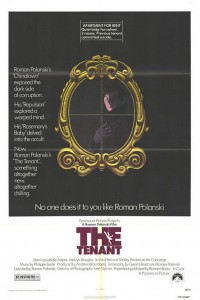 Here’s the idea behind “A Canadian, an American, a Lawyer, and an Elitist”: Rhett’s favorite movie is “Meatballs 4”, Shawn has an unhealthy fixation on Resident Evil, Richard scoffs at anything that isn’t pretentious and hoity toity, and Adam is a prick who hates everything. We all watch far too many movies, and spend our time analyzing them. So we each watch the same movie, write our analysis of them, and then go to a chat room to discuss it, unaware of what the others have written. A warning: if you haven’t seen the film we are discussing, it may not be best to read this article, because it is spoiler heavy.
Here’s the idea behind “A Canadian, an American, a Lawyer, and an Elitist”: Rhett’s favorite movie is “Meatballs 4”, Shawn has an unhealthy fixation on Resident Evil, Richard scoffs at anything that isn’t pretentious and hoity toity, and Adam is a prick who hates everything. We all watch far too many movies, and spend our time analyzing them. So we each watch the same movie, write our analysis of them, and then go to a chat room to discuss it, unaware of what the others have written. A warning: if you haven’t seen the film we are discussing, it may not be best to read this article, because it is spoiler heavy.
Analysis by a Canadian: Rhett Miller
Roman Polanski’s The Tenant presents us with an incredibly nihilistic vision. Polanski documents a breakdown in modern communication, where the limits of privacy and identity no longer hold discreet shape. He presents this within a cold and distant France, but it may as well be anywhere. He centers it all within a residential building, where everyone lives together, yet couldn’t be further apart. In our advanced stage of industrialization, what symbol better represents a microcosm of both society and impersonality than an apartment? The vision may be dark, but the film is intensely personal, as Polanski’s best films tend to be. In Polanski’s apartment trilogy, the third time apparently seems to be the charm.
The film begins with a complex camera move that scales the windows and walls of the apartment to be inhabited, where people nosily gaze out their windows, yet hide themselves behind the veils of their curtains. Right from this opening shot, Polanski gives the apartment an omnipotence that highlights the driving paradox of the film: nobody wants to hear from you, but everyone is listening. Trelkovsky (Polanski) inquires about the apartment for rent and is given the room with the stipulation that he must remain quiet. The former tenant of the room had not abided by such rules, and she ended up throwing herself out her window, dying shortly thereafter. The landlord and the rest of the apartment dwellers want only quiet and privacy, but they will pry into the lives of others to make sure they abide. Polanski’s world is one of complete paradox, where people practice exactly what they are against, thus bringing out a kink in interpersonal communication.
Polanski laces the entire film with scenes documenting society’s inability to communicate any longer. When Trelkovsky meets Stella (Isabelle Adjani) at the previous tenant (Simone)’s deathbed, he is unable to tell her that he has taken residence in Simone’s apartment. The disconnect continues when Trelkovsky meets up with a friend of Simone, as the friend confesses to have always been in love with her but unable to tell her so. The breakdown of communication is further documented in more subtle scenes, such as Trelkovsky asking for one kind of cigarette and getting another, the lies he tells about his uncle or his inability to tell the police what has gone awry. People talk, but nobody ever really connects. Trelkovsky holds many conversations with his landlord, and they all amount to the same thing: Trelkovsky saying one thing, and the landlord convicting him of another. Rather than connection, these characters are all driven by one of Polanski’s biggest infatuations as an artist: repulsion.
Just as Polanski documents a decay in the communication process, he also presents a similar perversion of identity in modern society. The longer Trelkovsky inhabits the house, the more he begins to transform into the previous tenant. He first starts the conversion by bedding the lesbian Simone’s lover, Stella, and continues by painting his nails, wearing a wig, dressing in drag, and ultimately hurtling himself from the same suicidal window. The other tenants of the apartment are always telling him what to do: to keep it down, to abstain from bringing women home, etcetera, and they indirectly drive him to shift his own perception of his identity. Coming from a Nazi occupied childhood, Polanski no doubt uses his character’s identity crisis to illustrate society’s ability to shape and mold the uniqueness of its members, whether they like it or not.
Polanski illustrates the personal nature of the film by having his character mention he is a Polish citizen. After mentioning this, several of the characters chastise him for not being French, despite his willingness to convert entirely to the idioms of his new city. The fact that Polanski’s character is new to France also brings light to another very personal matter in Polanski’s career, and that is his fleeing from the United States. Although The Tenant was the last film that Polanski made before his statutory rape allegations, it still nonetheless document’s Polanski’s self-image as an outsider in America. After Sharon Tate was murdered by the Manson’s, Polanski surely must have questioned whether or not he was welcome in America. The rape allegations were only the tip of the iceberg, Polanski had become the outsider much before that, and he uses The Tenant to show so.
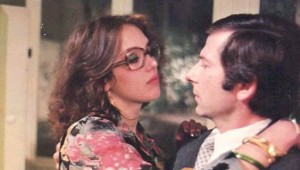 The Tenant, although again made before Polanski’s rape charges, can be seen today as a document of his character. In playing the lead, it is impossible not to confuse Trelkovsky for Polanski, and that is no doubt Polanski’s intent. Polanski shows that he is not the sexual menace American’s had pegged him as, and he demonstrates this best in his scenes with Isabelle Adjani. Throughout, Adjani’s character is the one to initiate the romance: she grabs his penis during a film screening, and she ultimately begs for him to take off his clothes and have sex with her later in the film. The woman is the sexual predator here, not Polanski, and as many reports of Polanski’s statutory rape claim, that was how it was in real life. Polanski’s assertion is that Samantha Geimer was very forthright in concealing her age and having sex with him and that he simply went along with the motions. His mousy passiveness in The Tenant makes it far tougher to conceive of Polanski in real life as one capable of rape. His conception of women in the picture seems oddly fitting for him though, as sexual provocateurs that cannot quite be trusted.
The Tenant, although again made before Polanski’s rape charges, can be seen today as a document of his character. In playing the lead, it is impossible not to confuse Trelkovsky for Polanski, and that is no doubt Polanski’s intent. Polanski shows that he is not the sexual menace American’s had pegged him as, and he demonstrates this best in his scenes with Isabelle Adjani. Throughout, Adjani’s character is the one to initiate the romance: she grabs his penis during a film screening, and she ultimately begs for him to take off his clothes and have sex with her later in the film. The woman is the sexual predator here, not Polanski, and as many reports of Polanski’s statutory rape claim, that was how it was in real life. Polanski’s assertion is that Samantha Geimer was very forthright in concealing her age and having sex with him and that he simply went along with the motions. His mousy passiveness in The Tenant makes it far tougher to conceive of Polanski in real life as one capable of rape. His conception of women in the picture seems oddly fitting for him though, as sexual provocateurs that cannot quite be trusted.
Thus, Polanski’s vision in The Tenant is one where women are the predators, and where society has become seemingly unable to listen. Everyone lives in such close proximity that they have shut themselves off from the connection of others, determined instead to protect their own privacy. It is a vile and vicious world, but it remains a vision distinct to Polanski’s core. It deals with the woman’s responsibility in his rape charges, and with his confused concept of identity brought out by the Nazi nationalism of his youth and his exile from the States in adulthood, always forcing him to become somebody different. Many would attest that The Pianist is Polanski’s most personal work, given the obvious Holocaust subject matter, but look beneath the surface, and when the window curtains are drawn aside, Polanski’s The Tenant shines brightest as the work closest to his being.
Analysis by an American: Shawn
Though I am a fan of puzzle films, it seems that a twist ending is required in every new film. Apparently, it has to be an easy-to-understand twist ending that must either be re-explained at the end of the film (Fight Club) or so unabashedly obvious, that trying to make your own interpretation is impossible (see any M. Night Shyamalan film). The reward of any puzzle comes from two things: the challenge and the completion. In a good jigsaw puzzle, a difficult picture may add to the sense of accomplishment upon its completion. However, The Tenant puzzles me in an altogether different way. If this film were a jigsaw puzzle, many of the pieces would be missing and it would seem that someone has intentionally thrown in pieces from other puzzles just to antagonize the viewer. This makes it an extremely difficult film to watch, and it does not form a complete image or even a particularly emotional one. Yet, I still find it very rewarding.
The story seems like a Seinfeld episode device; apartments are so hard to come by in France that people shop for them before the previous tenant’s suicide attempt was successful. Despite the fact that the apartment has no private restroom, horribly noisy pipes, and the landlord doesn’t want to rent it to him, Polanski’s character, Trelkovsky, just had to throw down 4000 francs for it. In one of the more puzzling aspects of the film, as mousy as Trelkovsky is portrayed, he somehow manages to get laid by the victim’s horribly dressed friend, Stella. He also seems to be a member of a social clique that doesn’t seem to match his personality. All this adds to the paranoia of the film. Trelkovsky doesn’t really fit in anywhere, and we aren’t given much information on his life prior to the film.
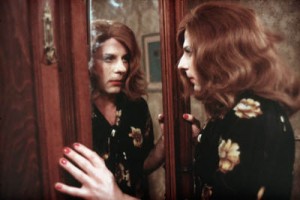 As a whole, The Tenant is very difficult to classify. It certainly has suspense, but there is truly nothing suspenseful except for the way the film is crafted. There are no true protagonists and no real antagonists either. The characters are interesting, but completely underdeveloped. I guess that the film could only be called by the dreaded title “psychological thriller.” It is even difficult to describe it that way, because there are few twists or events that occur within the movie. One-third of the film passes before anything generally unsettling or unnerving happens. Trelkovsky finds a tooth in his wall. He allows himself to be served without actually ordering anything at the local cafe. His apartment gets broken into and only his possessions, amongst all those of the previous tenant’s, are stolen. He picks up the former tenant’s hobbies, Egyptology being one of them. He switches cigarette brands. He starts cross-dressing, and worst of all; people stare blankly out the restroom window into nothingness. As he transgresses into the life of the former tenant, he seems even more inclined to prove that he is himself and not someone else. But he seems conflicted on who he is trying to prove this to; himself, or the other tenants.
As a whole, The Tenant is very difficult to classify. It certainly has suspense, but there is truly nothing suspenseful except for the way the film is crafted. There are no true protagonists and no real antagonists either. The characters are interesting, but completely underdeveloped. I guess that the film could only be called by the dreaded title “psychological thriller.” It is even difficult to describe it that way, because there are few twists or events that occur within the movie. One-third of the film passes before anything generally unsettling or unnerving happens. Trelkovsky finds a tooth in his wall. He allows himself to be served without actually ordering anything at the local cafe. His apartment gets broken into and only his possessions, amongst all those of the previous tenant’s, are stolen. He picks up the former tenant’s hobbies, Egyptology being one of them. He switches cigarette brands. He starts cross-dressing, and worst of all; people stare blankly out the restroom window into nothingness. As he transgresses into the life of the former tenant, he seems even more inclined to prove that he is himself and not someone else. But he seems conflicted on who he is trying to prove this to; himself, or the other tenants.
The theme of self seems to run through The Tenant. This is a theme that many years later will be used repeatedly in sci-fi films such as Blade Runner and Ghost in the Shell, both of which use similar ideas in a more visual fashion. Those films focus around a man-into-machine, or A.I. theme; whereas The Tenant takes an entirely imbalanced mental approach. Take Trelkovsky saying drunkenly, “At what precise moment does an individual stop being who he thinks he is? You cut off my arm, right? I say ‘me and my arm.’ You cut of my other arm. I say ‘me and my two arms.’ Take out my stomach, my kidneys-assuming that were possible – and I say ‘me and my intestines.’ And now, if you cut off my head; would I say, ‘me and my head,’ or ‘me and my body’? What right has my head to call itself ‘me?'” Trelkovsky shows here that he is mentally diseased and losing touch with himself. He has no enemies except his own mind, and this makes his descent more disconnected from the audience, since there is no way to associate or sympathize with him.
With the exception of several key scenes, (such as the suicide ending, which was wonderfully shot, it shows the dementia of Trelkovsky and via the other characters on the applauding on the rooftops), the film is visually drab. This droll technique seemed to be appropriate for the claustrophobic feeling of the apartment. The lack of a score for most of the film added to the isolating, empty feeling. These techniques were nothing new though, as other Polanski films like Rosemary’s Baby used them in the same manner. Here, though, without a likable character, the film drags, especially in the first half. When the only mystery you have one-third of the way in the film is “Who picked up the fruit?” it is no wonder that this is considered one of his lesser films. The conclusion, as mentioned by Roger Ebert, is poorly constructed. His comments on the ending echo mine, it “will come as a complete surprise to anyone who has missed every episode of ‘Night Gallery.'” It appears that Polanski was attempting a supernatural tone, something additional to frighten the audience. This worked for the ambitiousness of Rosemary’s Baby, but it seems very out of place here. I think The Tenant would have been better had it just ended with the second suicide attempt.
Overall, the acting isn’t great and the cinematography is generally dull. But the film is still somehow riveting. Perhaps I just liked seeing Polanski portraying a nut job. As opposed to his more accomplished and renowned films (which are a bit remote), I find The Tenant to be one of his most personal. Even if you don’t like it, it still makes a fine instructional film about the dangers of renting an apartment that doesn’t have a private bathroom. Face it, you’d go crazy too.
Analysis by a lawyer: Richard Stracke
I hoped to praise The Tenant, but try as I might, I couldn’t connect with it. To put things in perspective, I adore Repulsion and Rosemary’s Baby. As you might imagine, when I learned that Paramount was releasing this film with an obnoxiously low price tag, I was elated. After all, isn’t this the third in Polanski’s ‘apartment trilogy’? Isn’t it shot by famed Bergman cinematography Sven Nykvist? Doesn’t it star one of the world’s most gorgeous actresses? Isn’t it true that Egyptian mysticism plays a role in the mystery? Yes on all counts. Given those circumstances, why can’t I accept it as a full fledged masterpiece?
The film doesn’t know what it wants to be. Is it a serious re-examination of the themes that were so memorable in his earlier films? Is it a deeply personal reflection of Roman’s post-exile psyche? How about a playfully self-reflexive parody of his earlier ‘women’s films’? It seems to be a convoluted spattering of all three.
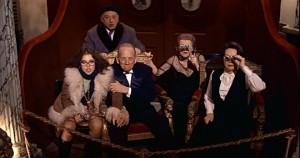 On first viewing (shortly after release), it was interesting. Although I assumed that he wasn’t entirely reliable, I bought into Trelkovsky’s paranoia. The bizarre occurrences were troubling. To put if briefly, I sympathized with the ‘victim’.
On first viewing (shortly after release), it was interesting. Although I assumed that he wasn’t entirely reliable, I bought into Trelkovsky’s paranoia. The bizarre occurrences were troubling. To put if briefly, I sympathized with the ‘victim’.
This time around, much of what once seemed mysterious felt shallow. What does Egypt have to do with anything? The same goes for the teeth and the ominous interactions with the other tenants. Few (if any) of occurrences add up to much more than symptoms of his delirium. There is only so far that a simple conceit can take you. If you examine individual scenes, there is little use denying that the claustrophobic photography and troubling concepts are unsettlingly effective. Although I tire of having every seemingly minor detail in thrillers coming back to play a huge role in the finale, the converse is even less satisfying. Apart from creepy details and questionable confrontations with neighbors, there is no evidence that any of his actions caused by more than internal factors. There is nothing comparable to Cassavettes’ Faustian bargain or Repulsion‘s sexual paranoia. ‘The Tenant’ seems to be less of a purposeful satire of the earlier films, than a sloppy derivative work.
In fact, as much as I hate to say it, it feels as gimmicky as Shyamalan. The film is premised on the idea that a wholly unreliable narrator can remain gripping for over two hours. When seeing the film for the first time the technique has a shot. When re-examined, Trelkovsky’s condition was painfully obvious. As, I mentioned, some scenes and ideas work well when divorced from the rest of the film, but it lacks subtle ambiguities and a captivating lead.
Rosemary’s Baby is fascinating because until the final moments, it is possible to argue that Farrow’s traumas were not supernaturally induced, but the product of an unstable mind. The Tenant is far too quick to reveal that Polanski is the deluded one. Isn’t that how Repulsion worked? Superficially, yes, but as bizarre as it may be, Deneuve’s decline is consistent. After multiple viewings, it is possible to connect dots and gather new insights about her. With The Tenant, I was grasping at straws. I learned nothing new about the character. I was simply frustrated.
Polanski’s decision to cast himself as the lead causes major issues. He is present in almost every scene. Denueve’s role was similarly large, but where Polanski is creepy in an old goat sort of way, her fragility makes her sympathetic. While certainly the star of her film, Farrow is balanced with other interesting characters and a coherent plot. In the absence of a supernatural influence or clear ‘origin’ for his psychic split, ‘The Tenant’s’ star needed to be exceptional. Casting himself as the lead may have been therapeutic. Although I can empathize with his traumas, his film would have been stronger had he cast someone else as Trelkovsky.
Like The Fearless Vampire Killers (which almost everyone else seems to adore), his brand of humor only seems to work when tackled by more adept thespians (Nicholson to name one). It isn’t the darkness of the humor, but his squirrelly screen presence that rubs me the wrong way. I find him neither dramatically gripping nor laugh out loud hilarious. A measure of meekness was required to make him susceptible to the demands of his neighbors, but pre-complete insanity Trelkovsky is timid to the point of being uninteresting. To compensate for the slow start, the final act goes wildly over the top. This inconsistency puts a significant burden on the film. Unlike the earlier films, his descent was unsteady and abrupt. If the tone was consistently chilling or entirely over the top, it would have been easier to accept. Although I have my doubts about Polanski’s ability to make an outright comedy, he is adept at suspense. The bipolar progression leads to a film that does a disservice to both extremes.
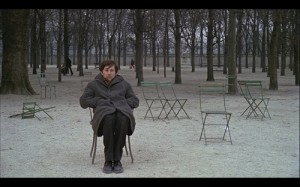 The supporting cast doesn’t help matters. On the positive side, many of the superficial characters have great facial features and costumes. As satisfactory as they are, just like the details in his apartment and the nearby restroom, they influence mood and little else. Dubbing may be partially to blame, but his drinking buddies are nearly impossible to watch. Although I once thought the task impossible, the costume department managed to make Adjani unattractive. If the dumpy glasses were mandated by the role, I wouldn’t have a problem with it, but so far as I can tell, they thought it looked good. She has little to do and to be honest; almost anyone could have played the part. If she were an unknown I would have few gripes, but I expected more from her role.
The supporting cast doesn’t help matters. On the positive side, many of the superficial characters have great facial features and costumes. As satisfactory as they are, just like the details in his apartment and the nearby restroom, they influence mood and little else. Dubbing may be partially to blame, but his drinking buddies are nearly impossible to watch. Although I once thought the task impossible, the costume department managed to make Adjani unattractive. If the dumpy glasses were mandated by the role, I wouldn’t have a problem with it, but so far as I can tell, they thought it looked good. She has little to do and to be honest; almost anyone could have played the part. If she were an unknown I would have few gripes, but I expected more from her role.
Despite the complaints, I won’t go so far as saying that this is a terrible film. It is merely a disappointment. Had a lesser director made this film, I may have focused on the positives its atmosphere and cinematography instead of where it stumbled. Polanski’s earlier films demonstrate what he is capable of. Rather than recapturing the dread of the trilogy’s earlier films, he seemed content releasing an incoherent caricature. Such a riff on familiar themes may have been amusing for the cast and therapeutic for the director, but I wasn’t in on the fun.
Analysis by an elitist: Adam
The fundamental problem with letting the audience know that your main character is crazy is that we have to be given a reason to want to follow them at that point. It’s more of an impossible hurdle when we are seeing everything from that character’s perspective, as opposed to on the outside, where we might observe them. If, in a film such as Clean, Shaven, the mood is disturbed all along, and this is way the world is presented to us, it may be a fascinating peak inside a schizophrenic’s mind. Or, in the case of Fight Club, the events themselves are dark and funny, and the character we’ve come to understand for the previous 105 minutes is slowly coming apart, it is easier for the audience to accept that. But in The Tenant, Roman Polanski wants us to maintain interest in a character who has offered the viewer nothing, he is stuffy, remote, and doesn’t have much to say. When he loses his sanity, we don’t have any investment in it, because we neither care about this guy or his plight.
The further issue is that it happens far too early in the film. When Trelkovsky imagines he is being choked by Madame Dioz, soon after she brings him the petition, Polanski gives us the point of view that he is choking himself. So from then on, all the “realities” we are given, are tainted by our knowledge that he has lost it. That this happens with 45 minutes remaining in the film is an enormous mistake, because then we are just waiting it out until he kills himself, marking time until the inevitable. Unlike with Rosemary’s Baby, there has been no hint or development of a supernatural or bizarre element that causes tenants to become paranoid and kill themselves. All we’re given is that his neighbors are petty, alienating people who like to scheme against each other, which, while not comforting, isn’t completely out of the ordinary. And what are we supposed to believe when, in the scene that directly follows his self-choking, Trelkovsky is calmly talking to the police about the robbery in his home? Did someone organize these scenes incorrectly? The self-choking would surely fit better after we get the official cliched nod that he’s gone crazy, when he’s sweating profusely in bed five minutes later.
P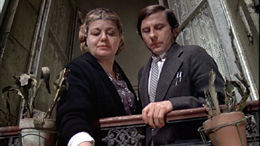 erhaps the whole movie is a comedy, a dark satire of city living, where you have to struggle to find even the most overpriced and dingiest apartments. I don’t imagine there would be much fighting over a place where the previous tenant has tried to commit suicide and isn’t even dead yet, especially with the bathroom all the way on the other side of the building. The humor plays out for the first few scenes, from Winters as the concierge informing Trelkovsky that, “You can still see where she fell,” to the fact that he visits Simone Choule at the hospital to see if she’ll die, so he can move in. He even manages to avoid conversation with Sylvie about anything relating to Simone, but then the details start to crumble, such as, why would such an uptight, uncomfortable, and prissy guy (who never seems to take off his suit jacket unless he is forced to) take her to a kung fu movie? And it doesn’t make much sense that after the movie, he doesn’t try to pursue her further than just a drink, when she clearly wants to sleep with him. He doesn’t even ask for a phone number. Though this is part of Polanski’s point about isolation, that no one uses phones in the film (in one scene, Polanski says he has to make a phone call, but lies and goes to the bathroom instead), the only forms of communication are familiarity (those that you see every day) and coincidence (those that you run into, as Trelkovsky does Sylvie later in the film). This is furthered by the way he is treated at the coffee shop across the street, where they attempt to deal with him exactly as they did Simone. It’s as if they don’t notice he’s a different person. Even in the scene with the policeman, he doesn’t look at Trelkovsky’s picture, only the condition of the piece of paper and that he hasn’t updated his address. The film is more overt about existence, that Trelkovsky begins to change into the previous tenant is considerably more obvious.
erhaps the whole movie is a comedy, a dark satire of city living, where you have to struggle to find even the most overpriced and dingiest apartments. I don’t imagine there would be much fighting over a place where the previous tenant has tried to commit suicide and isn’t even dead yet, especially with the bathroom all the way on the other side of the building. The humor plays out for the first few scenes, from Winters as the concierge informing Trelkovsky that, “You can still see where she fell,” to the fact that he visits Simone Choule at the hospital to see if she’ll die, so he can move in. He even manages to avoid conversation with Sylvie about anything relating to Simone, but then the details start to crumble, such as, why would such an uptight, uncomfortable, and prissy guy (who never seems to take off his suit jacket unless he is forced to) take her to a kung fu movie? And it doesn’t make much sense that after the movie, he doesn’t try to pursue her further than just a drink, when she clearly wants to sleep with him. He doesn’t even ask for a phone number. Though this is part of Polanski’s point about isolation, that no one uses phones in the film (in one scene, Polanski says he has to make a phone call, but lies and goes to the bathroom instead), the only forms of communication are familiarity (those that you see every day) and coincidence (those that you run into, as Trelkovsky does Sylvie later in the film). This is furthered by the way he is treated at the coffee shop across the street, where they attempt to deal with him exactly as they did Simone. It’s as if they don’t notice he’s a different person. Even in the scene with the policeman, he doesn’t look at Trelkovsky’s picture, only the condition of the piece of paper and that he hasn’t updated his address. The film is more overt about existence, that Trelkovsky begins to change into the previous tenant is considerably more obvious.
And yet, I would have forgiven most of these issues if Polanski’s acting had been better. Catherine Deneuve also slowly goes crazy in Polanski’s Repulsion, but her progression is more believable because of her subtle shifts. I didn’t buy almost anything that occurred to Trelkovsky, because of Polanski’s performance. I couldn’t fathom Isabelle Adjani reaching for his crotch in the movie theater, because it certainly wasn’t out of grief that she was doing it. I laughed out loud at the scene where he was dressed in drag, looking in the mirror and said “they’ll never turn me into Simone Choule. NEVER!!!” And what could have been the turning point, when he is desperate and lost, and he seeks Sylvie’s help at her apartment, Polanski is totally over the top, which takes us right out of the film. By this point, the humor has become unintentional, so when he tells her he loves her, and she mysteriously says it back (considering they’ve shared all of an interrupted handjob and Trelkovsky being too drunk to have sex with her, followed by his vomiting into her toilet), it’s no longer funny on purpose. It’s hard to believe that Polanski resorts to the tactic of zooming in on the frightened eyes and a canned scream to close the movie. He is normally an oppressive, suffocating filmmaker, where we watch as the characters feel the walls closing in on them. But he is able to rely on actors who we can follow with interest, if not empathy. As an actor, he emotes little more than creepiness, so his descent into madness is impossible to engage with. If the movie treats him like a sinister joke, then it is funny. But what begins as a comedy of alienation, turns to a frustrating horror film, and ends as a cartoon.
The chat.
Adam Now I can assume that we all saw it on DVD, and it automatically played in English. But since half of the actors spoke French and were dubbed, did anyone watch it in French with English subtitles? Since Polanski did his own dubbing. I switched back and forth because I found things like the coffee shop, with their thick NY accents to be a distraction in Paris.
Richard Did it improve the performances especially in the case of his friends?
Adam Yes, it did improve the performances, they sounded less like construction workers
Rhett I never really had a problem with the performances, since Polanski sounded just as I expected him to
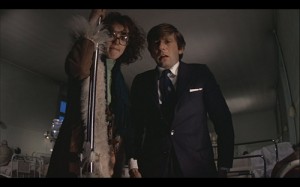 Shawn The party attendee that was reading the newspaper to him, the guy with the glasses, was horribly dubbed
Shawn The party attendee that was reading the newspaper to him, the guy with the glasses, was horribly dubbed
Rhett And considering the theme of the entire film seems to be about the decay of communication, I guess the dubbing seems even more fitting
Adam I noticed that no one used phones. People would just drop in all the time. He kept having to rearrange his life for them, like the guy who comes by and doesn’t know she killed herself.
Rhett Nobody would ever really listen to what anyone else had to say. Polanski would ask for a certain brand of smokes, and they’d give him Marlboro or his landlord would accuse him of something and he would deny it completely.
Adam Well that led into something else. That hokey ending suggests that since he sees himself, maybe the whole movie is actually the story of her? They really think it is her and so they treat him like her. Same drinks, smokes. And since he doesn’t have much of a personality, he just adopts hers.
Rhett Yeah, that is a good read
Richard Would that imply that he is really going out in drag for much of the film? Because there are clear blackouts, especially early. He very well could have done all sorts of things unknowingly.
Adam It could be
Rhett And since she was a lesbian, him having sex with Adjani works. Adjani says something along the lines that she had no boyfriend because she only liked women
Adam Sort of a Fight Club precursor
Shawn His background is completely left blank. Not even mentioned. No schooling, not what he really does at his job.
Adam When he meets Adjani and they have a drink, the lesbianism is implied. She says that she didn’t have a boyfriend and would never be upset over a man.
Richard Do you think that could tie to his line about ‘not being that type of guy’ when the landlord questions him about inviting women?
Adam The fact that his personality is invisible it leaves open that problem about his past. Where did he used to live? Why did he have to move? To such a shitty place especially
Rhett What do you guys make of the hole and the teeth. At first, the way he was fingering it, I thought perhaps it was a metaphor for a vagina dentata of some sort, but it didn’t seem to materialize all that much.
Richard I never made sense of the teeth. That was part of my problem with the film. Many of the scenes seem creepy individually, but things like the teeth, while startling on first viewing were non-sensical on second viewing. Apart from Adjani’s comment about her childhood and his dream about losing two teeth, they never returned to them.
Rhett I guess the teeth bit was only there to provide the basis for that body monologue he has with Adjani
Adam The body monologue needed to come to fruition later.
Shawn Well I have two concepts on the teeth thing. First, the film was about one-third done at that point and nothing suspenseful had happened. The other large and obvious element is the obsession with Egyptology
Adam When he falls out of the window the first time, it appears that his leg has been cut in half. “Me and my leg.” But then we see he just has it pulled back, it was a disappointment.
Richard When it shows the shot of the leg, could it be that he was initially in such pain that he presumed that it had been severed.
Rhett Another interesting thing with the teeth, is that when he was dressed as the woman he was missing a tooth, but after he removed the wig the tooth seemed to reappear in his mouth.
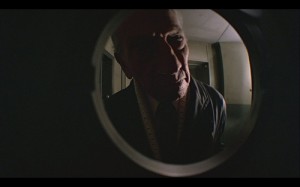 Shawn She unwraps herself in the bathroom, which has the hieroglyphics on the wall. The Simone is in a full-body cast. And the whole conversation of “removing body parts” and putting them in to receptacles.
Shawn She unwraps herself in the bathroom, which has the hieroglyphics on the wall. The Simone is in a full-body cast. And the whole conversation of “removing body parts” and putting them in to receptacles.
Rhett I guess it works, as if to suggest that like a mummy, the woman’s spirit lives on within that apartment complex.
Adam Yeah, but with the faint relation to Egyptology, it seems he is grasping at straws. Things that connect to each other faintly, but don’t connect on the whole, in the larger sense. It’s like he thought it was enough to have a clever concept, but didn’t bother making sense of it
Richard Each time I tried to make a connection, I came up with nothing, while Rosemary and Repulsion are more coherent and easier to repeat.
Shawn Who did he really hear about the apartment from?
Adam He says a relative
Shawn Yes, but who? No family is ever mentioned or implied and he knows no one in the building.
Adam The problem with the landlord thinking he’s not the right type of guy is that the landlord complains that he saw a woman up there, after he insisted he was a quiet bachelor. And bachelor isn’t really a term used for women.
Rhett I thought the way Polanski’s character was underdeveloped forced you to project what you knew about Polanski himself onto the character. That he was forced to move often during his life, be it concentration camps or American exile.
Adam Perhaps that’s the reason he moves? As if he were a forced hermit? it is not clear why he moves, they establish his previous address in the police scene. So he is less of a fantasy.
Richard Didn’t they even name the street in that scene? It would be interesting to know what sort of area the old address was, to give a clue about his past.
Adam Yes, they do say what street it is. I was trying to connect things that were even more random, is it ever established what kind of alcohol Simone liked to drink? Because when he has that first drink with Sylvie, he orders a martini, and then goes to the bathroom (even though he said he was going to make a call, we never see him do it, and to whom would he make this call to), there is whiskey in the glass. Or perhaps there was just a continuity error.
Rhett I thought using Sven Nykvist as the cinematographer was a perfect choice, since Bergman’s films are all about the disjoint in communication as well. The scenes of painful screaming in The Tenant really echo those in Cries & Whispers.
Shawn Actually he says he is going to go make a call, but instead takes a piss.
Rhett He compulsively lies throughout. He is always saying stuff about his uncle when we know he is lying.
Richard As far as the cinematography goes, I felt that was the high point, especially the use of mirrors and deep framings with multiple doors and windows
Rhett I agree, Richard, I thought it was very effective, particularly the opening shot. It paints the apartment as a prison, where people lock themselves within their rooms, just staring out the windows.
Richard That and the long roving shot of the apartment shot immediately before the suicide were my favorites. I loved the theatricality of the second shot.
Shawn Where the outside windows are dressed as balconies
Richard Many of the characters are there, red decorations on the balconies….
Rhett That shot mimics the opening shot
Shawn I like the costume changes on the tenants after his first suicide attempt.
Rhett There is always something not quite right in each scene, almost like forced continuity errors to keep things oft putting
Shawn The manager and his wife have these Hammer film inspired clothing, only slightly altered from their original clothing. One woman had a serpent’s tongue. It was a great scene.
Rhett I would have probably liked it better without the serpent part, as it covered the same ground as rosemary’s baby.
Richard How did everyone react to Adjani’s horrid glasses? I’ve seen the majority of her early films and apart from a few bedroom scenes she looks worse than I ever imagined her looking. I didn’t see any reason why she needed to look so terrible. After all, she was the romantic interest.
Adam To be honest, I didn’t even recognize her until nearly the end.
Rhett Yeah, after about 25 minutes of the film I paused it and looked on IMDB because I could have sworn Adjani was in it. I didn’t even recognize her under that hideous muff and glasses combo. She definitely looks terrible, thankfully Herzog would redeem her a couple years later.
Adam Do you think the crazy was telegraphed too early? Because I think it deflated the third act of the movie. If we know someone is crazy, we tend not to believe what they see. I couldn’t have cared less about anything that happened in ACT III. Because since we just saw him choking himself.
Richard This was my second viewing and this time, since it was clear from the start and there were so many red herrings and disconnects, I had trouble connecting at all.
Rhett Yeah Adam, that did come a bit early.
Adam I don’t believe that anything is wrong with the neighbors. They’re annoying, but that’s it.
Richard That was my impression.
Adam They’re not out to kill him, and his histrionic acting is laughable.
Shawn I agree, they should never have showed that he was crazy.
Richard Would the complaint be due to him stomping around in drag while unaware?
Rhett I think it is more just the pressure that the neighbors and society put upon Polanski’s character to change that ultimately makes him crazy. Nothing supernatural.
Adam I couldn’t even figure out the point of the reveal when we see him choking himself. He stumbles in somewhere, I couldn’t tell if it was his apartment. He sees some homeless woman in the doorway. He spooks her. Then he imagines the nosy woman with the petition choking her. That moment is so overt, that it flattens the progression of the next 40 minutes.
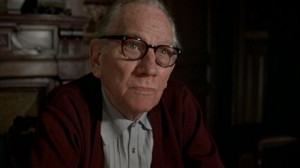 Richard It looked different than his apartment. It is clear that he is crazy, but does it need to be THAT clear? Rosemary’s Baby is more interesting because it is more ambiguous.
Richard It looked different than his apartment. It is clear that he is crazy, but does it need to be THAT clear? Rosemary’s Baby is more interesting because it is more ambiguous.
Rhett I actually liked the tenant a lot more. Supernatural movies always seem to be a cop out, since everything can just be explained by “they were from hell” or “they were spirits”, etc. The Tenant offers more food for thought since it exists in a totally natural world.
Shawn Rosemary’s Baby, forces the “Hell baby” ending. As opposed to the The Tenant forcing the “I’m crazy” aspect.
Adam If you remember in The Tenant, there was this creepy shot where he reached for a glass of water as he was sleeping the bottle of water is actually a set, as is the chair.
Richard That was one of my favorite bits.
Adam That would have been a great way to start the progression of madness, slowly. But it was ruined by the choking.
Richard Speaking of cop outs and comparisons to his older work, does anyone else feel like this was a simple derivative work? A blander repeat of Repulsion/Rosemary?
Rhett I actually thought this was a good synthesis of all his previous work. The breakdown of communication in Knife in the Water and the paranoia of industrialized city living from Rosemary’s Baby
Richard I don’t remember if it was just before or after that glass scene, but one sequence seemed disproportionately larger furniture. Was my mind playing tricks on me?
Adam Well, Polanski is really short. That might have been it.
Rhett The scene with Polanski trashing Adjani’s room did seem disproportional.
Adam And hilarious.
Rhett But there were several instances where the cinematography would distort all the aspects in the frame too.
Shawn There was a scene where I thought their were disproportionate staircases.
Richard My favorite comic moment was when he struck the child. The one in front of the fountain.
Rhett Haha and just runs away. Stupid kids.
Adam When he’s talking to himself in drag and at the bar, I couldn’t help but laugh.
Shawn Yes, the beating of the kid was awesome.
Richard I hate to spend too much time on the teeth, but what was the point of the missing tooth scene? It clearly didn’t happen, at least not then. I even checked is smile in later shots and the teeth were back. Was it just meant to be creepy/in connection with his vision of the mummy?
Rhett I can’t make any sense of it either. Probably just a materialization of how he sees himself when he wears the wig and takes on her identity.
Richard Did anyone think about how he ironically cast himself as the female lead in connection with the previous films ? I don’t think it was very effective if he meant it to be a parody, but the argument may be there
Shawn Simone “dies” at 4:20 pm. Drug reference?
Rhett I thought he cast himself so he could explore his own life, since the character in the film, like Polanski, is a Polish man trying to fit in a new and unaccepting society.
Richard This was right after his exile isn’t it?
Shawn Right before. I honestly think that Polanski had a breakdown either before or during this movie… Does Roman’s character really seem like someone his friends would hang out with?
Adam Yeah, Shawn, I had that issue too. They don’t seem anything like him. When they come over the party, he seems uncomfortable.
Shawn There is not a single one that isn’t loud and obnoxious.
Richard I couldn’t bear them and failed to see the connection. At any rate, he seems to really hold contempt for women in this film.
Rhett Constantly inserting little digs into “women’s lib” and the way he makes Adjani the sexual predator that seduces him, not vice versa.
Richard “As disclosed by Jane’s pleading, this action arises from certain events which took place in Los Angeles on March 10, 1977. It is alleged that Polanski, who was then 43 years of age, drove Jane, then a 13-year-old minor, to the home of a friend on the pretext of a professional photography session.”
Adam The only woman who could be thought of as sympathetic is tied up while her child watches after having put either vomit or dog poo outside her neighbor’s doors.
Richard Speaking of woman and child, do you think that she existed? There were issues about whether she had a son or daughter.
Adam No, she was just another level of paranoia.
Rhett Maybe that was kind of the same split as what was going on with Polanski’s character, whether he was a guy or the female tenant.
Adam Where your good deeds deserve dog shit outside your door, lest you be ostracized.
Shawn Whenever I leave dog shit outside a house, I always make sure I do it in front of mine. There is a valuable life lesson there.
Rhett As good as all these “personal” Polanski films are, I don’t think anyone would argue that a Polanski biopic would be far more bizarre than any of the films he has made… Starring Jamie Foxx.
Shawn Did he just imagine dropping the fruit on the staircase? Who do you think robbed his apartment? Himself?
Richard Was the apartment actually robbed or did he destroy it ala Adjani and fail to lock the door when he left?
Shawn Well the only things that were taken were “his.” Not Simone’s.
Adam Whatever personality he brought to the apartment.
Shawn Exactly. He mentions his camera and television.
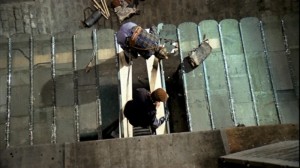 Richard Did anyone actually look to see if the named items were ever really there? I assume they were.
Richard Did anyone actually look to see if the named items were ever really there? I assume they were.
Adam I saw him take out what looked like a TV.
Shawn It was after this robbery that he started focusing in on the previous tenant’s belongings.
Adam And so he had no choice but to take on her persona.
Shawn Precisely. I also believe that the hand that was reaching in his window was his own.
Adam Yes it was, because he didn’t hurt his hand on the outgoing glass.
Shawn He did suffer a wound, but it was a cut wound, not a shard wound. So the knife went into himself.
Rhett It is interesting that he doesn’t really seem to be conscious of his transformation at the start. Like he is just holding a conversation and painting his nails, as if nothing were happening.
Adam Yes, when he is just doing his nails for no reason.
Rhett And then some scenes he just has moderate blush on, again unnoticed.
Richard How about the scene where the landlord accuses him of having a lady over? Was that just him talking in her voice and prancing around in heels?
Rhett Yeah, I just assumed it was the heels.
Adam Yes it was. But I thought that was supposed to be clear to Polanski.
Rhett Or maybe someone seeing him through the bathroom window.
Shawn I like that he doesn’t object at all to being given drinks he didn’t order in the cafe.
Adam It happened a few times. When he’s comforting that guy and the drunkard comes over and says “the round is on me, except that guy.”
Shawn And then he finally made an attempt to order something different, the clerk was visibly upset.
Adam He’s actually been given drinks he didn’t order four times, twice in the cafe, once with the guy who’s life he “saved,” and once when he orders the martini and gets the whiskey.
Rhett And smokes he didn’t want.
Richard How about the late scene when he asks to buy a gun? That didn’t seem to connect because there was no indication that he wanted to murder the neighbors or die by any means other than the window.
Adam I thought that was a cheap attempt to trump up interest, just so he could be threatened by more people, when the guy in the bar threatens to call the cops on him.
Shawn I thought it was suicidal thing to say.
Rhett And why would he ask a bartender of all people for a gun?
Richard Maybe he assumed that any man who would risk going into public with such a horrible shirt would have to pack heat.
Adam He’ll be here all week. Try the veal!
Rhett That red shirt was very seductive.
Shawn This film also features the most enterprising bum I have ever seen.
Adam Yep, just took the money right out of his hands.
Shawn “All I have is notes” “That’s fine, I’ll take what you got. You don’t want to look cheap in front of your girlfriend.”
Rhett He wasn’t a bum, maaaaan, he was a starving artist!
Shawn I leave us with a final stupid question. Is it possible to play with yourself while standing absolutely still with Roman Polanski staring at you?
Richard Only in Europe.




Miguel León says:
June 15th, 2012
6:59 am
Just read the book by Roland Topor. Things become much complicate than mixing references of nowadays chewing gum culture…